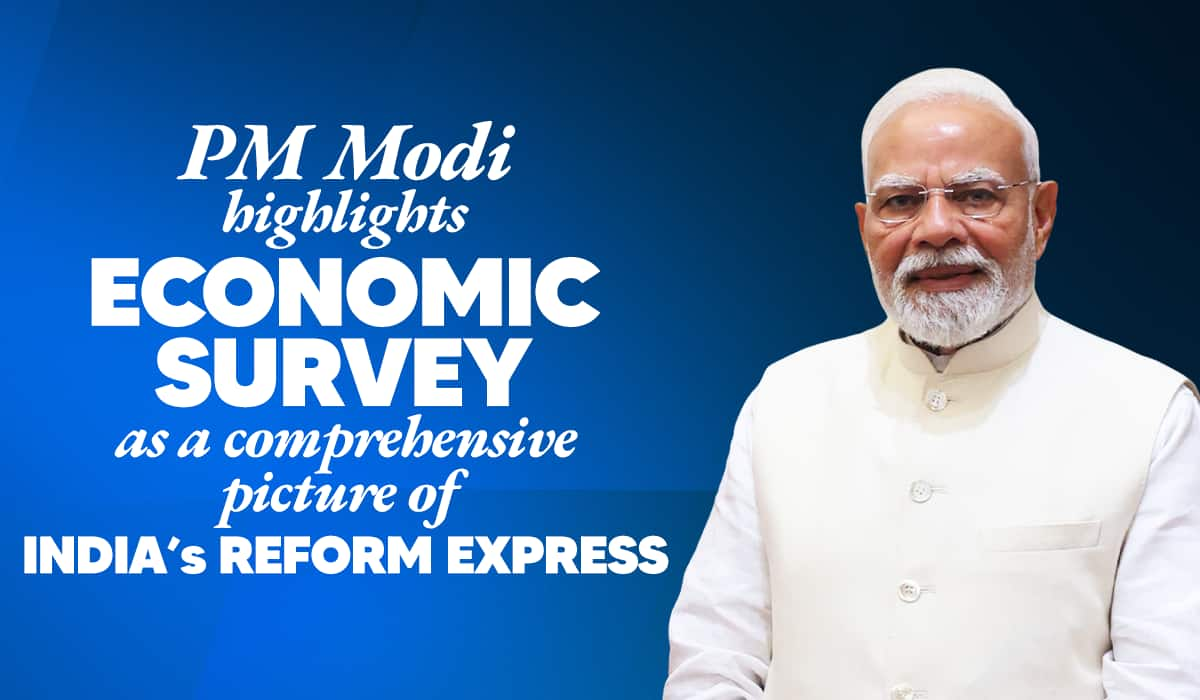The Prime Minister, Shri Narendra Modi addressed policy makers in the domain of education and skill development, students and teachers, across the country via video conferencing, to mark the completion of one year of reforms under the National Education Policy 2020. He also launched multiple initiatives in the education sector.
Congratulating the countrymen and students for New Education Policy completing one year, the Prime Minister lauded the hard work of teachers, professors, policymakers in realizing the New education policy on the ground, even during the difficult time of Covid-19. Noting the significance of the year ‘Azadi ka Amrit Mahotsav’, the Prime Minister said that the new Education Policy will play a major role in this important period. The Prime Minister said our future progress and growth is dependent on the level of education and direction given to our youth today. “I believe that is one of the bigger factors in ‘mahayagya’ of national development”, said the Prime Minister
The Prime Minister noted the changes brought by the pandemic and how normal online education became for the students. More than 23 hundred crore hits on Diksha portal bear testimony to the utility of portals like Diksha and Swayam.

The Prime Minister noted the strides made by the youth from small towns. He cited great performance at the Tokyo Olympics by the youth from such towns. He lauded the efforts of the youth in the fields of robotics, AI, start-ups and their leadership in industry 4.0. He said if the younger generation gets the environment suitable for their dreams, there is no limit to their growth. He stressed that today’s youth wants to decide their systems and their world on their own terms. They need exposure and freedom from the shackles and restrictions. New Education Policy, assures our youth that the country is fully with them and their aspirations. Artificial Intelligence programme which was launched today will make the student future oriented and will pave the way for AI-driven economy. Similarly, National Digital Education Architecture, (NDEAR) and National Education Technology Forum (NETF) will go a long way in providing a digital and technological framework to the entire country, the Prime Minister said.
The Prime Minister highlighted the openness and absence of pressure in the New Education Policy. He said that there is an openness at policy level and openness is also visible in the options available to the students. Options like multiple entry and exit will free students from the restrictions of staying in one class and one course. Similarly, modern technology based Academic Bank of Credit system will bring revolutionary change. This will give confidence to the student in choosing stream and subjects. 'Structured Assessment for Analyzing Learning levels', SAFAL will take away the fear of examination. The Prime Minister reiterated that these new programmes have the capability to change India’s destiny.
Quoting Mahatma Gandhi, the Prime Minister emphasized the importance of local languages as medium of instructions. The Prime Minister informed that14 engineering colleges of 8 states are starting to impart education in 5 Indian languages Hindi, Tamil, Telugu. Marathi and Bangla. A tool has been developed for translating engineering course in 11 languages. This emphasis on mother tongue as the medium of instruction will instil confidence in the students from poor, rural and tribal background. Even in the elementary education mother tongue is being promoted and Vidya Praveshprogamme, launched today, will play a big role in that. He also informed that Indian sign language, for the first time, has been accorded the status of language subject. Students will be able to study it as language also. There are more than 3 lakh student who need sign language for their education. This will give a boost to Indian sign language and will help the divyang people, said the Prime Minister.
Underlining the critical role of teachers, the Prime Minister informed that from the formulation stage to implementation, teachers are active part of New Education Policy. NISHTHA 2.0, launched today will provide training to teachers as per their needs and they will be able to give their suggestions to the department.
Prime Minister launched the Academic Bank of Credit that will provide multiple entry and exit options for students in Higher education; 1st Year Engineering Programmes in Regional Languages and Guidelines for Internationalization of Higher Education. The initiatives to be launched also included Vidya Pravesh, a three month play based school preparation module for Grade 1 students; Indian Sign Language as a Subject at secondary level; NISHTHA 2.0, an integrated programme of teacher training designed by NCERT; SAFAL (Structured Assessment For Analyzing Learning Levels), a competency based assessment framework for Grades 3, 5 and 8 in CBSE schools; and a website dedicated to Artificial Intelligence. The event also witnessed the launch of National Digital Education Architecture (NDEAR) and National Education Technology Forum (NETF).
नई राष्ट्रीय शिक्षा नीति को एक साल पूरा होने पर सभी देशवासियों और सभी विद्यार्थियों को बहुत-बहुत शुभकामनाएं।
— PMO India (@PMOIndia) July 29, 2021
बीते एक वर्ष में देश के आप सभी महानुभावों, शिक्षको, प्रधानाचार्यों, नीतिकारों ने राष्ट्रीय शिक्षा नीति को धरातल पर उतारने में बहुत मेहनत की है: PM #TransformingEducation
भविष्य में हम कितना आगे जाएंगे, कितनी ऊंचाई प्राप्त करेंगे, ये इस बात पर निर्भर करेगा कि हम अपने युवाओं को वर्तमान में यानि आज कैसी शिक्षा दे रहे है, कैसी दिशा दे रहे हैं।
— PMO India (@PMOIndia) July 29, 2021
मैं मानता हूं भारत की नई राष्ट्रीय शिक्षा नीति राष्ट्र निर्माण के महायज्ञ में बड़े factors में से एक है: PM
21वीं सदी का आज का युवा अपनी व्यवस्थाएं, अपनी दुनिया खुद अपने हिसाब से बनाना चाहता है।
— PMO India (@PMOIndia) July 29, 2021
इसलिए, उसे exposure चाहिए, उसे पुराने बंधनों, पिंजरों से मुक्ति चाहिए: PM @narendramodi #TransformingEducation
नई ‘राष्ट्रीय शिक्षा नीति’ युवाओं को ये विश्वास दिलाती है कि देश अब पूरी तरह से उनके साथ है, उनके हौसलों के साथ है।
— PMO India (@PMOIndia) July 29, 2021
जिस आर्टिफिसियल इंटेलीजेंस के प्रोग्राम को अभी लॉंच किया गया है, वो भी हमारे युवाओं को future oriented बनाएगा, AI driven economy के रास्ते खोलेगा: PM @narendramodi
हमने-आपने दशकों से ये माहौल देखा है जब समझा जाता था कि अच्छी पढ़ाई करने के लिए विदेश ही जाना होगा।
— PMO India (@PMOIndia) July 29, 2021
लेकिन अच्छी पढ़ाई के लिए विदेशों से स्टूडेंट्स भारत आयें, बेस्ट institutions भारत आयें, ये अब हम देखने जा रहे हैं: PM @narendramodi #TransformingEducation
आज बन रही संभावनाओं को साकार करने के लिए हमारे युवाओं को दुनिया से एक कदम आगे होना पड़ेगा, एक कदम आगे का सोचना होगा।
— PMO India (@PMOIndia) July 29, 2021
हेल्थ हो, डिफेंस हो, इनफ्रास्ट्रक्चर हो, टेक्नालजी हो, देश को हर दिशा में समर्थ और आत्मनिर्भर होना होगा: PM @narendramodi #TransformingEducation
मुझे खुशी है कि 8 राज्यों के 14 इंजीनियरिंग कॉलेज, 5 भारतीय भाषाओं- हिंदी-तमिल, तेलुगू, मराठी और बांग्ला में इंजीनियरिंग की पढ़ाई शुरू करने जा रहे हैं।
— PMO India (@PMOIndia) July 29, 2021
इंजीनिरिंग के कोर्स का 11 भारतीय भाषाओं में ट्रांसलेशन के लिए एक टूल भी develop किया जा चुका है: PM #TransformingEducation
भारतीय साइन लैंग्वेज को पहली बार एक भाषा विषय यानि एक Subject का दर्जा प्रदान किया गया है।
— PMO India (@PMOIndia) July 29, 2021
अब छात्र इसे एक भाषा के तौर पर भी पढ़ पाएंगे।
इससे भारतीय साइन लैंग्वेज को बहुत बढ़ावा मिलेगा, हमारे दिव्यांग साथियों को बहुत मदद मिलेगी: PM @narendramodi #TransformingEducation














